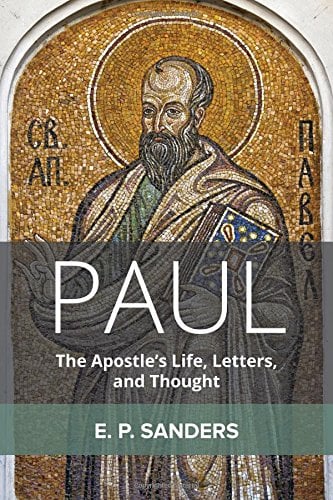p. 525—“The translators who changed Deut. 27.26 from its primary emphasis on intention and commitment to perfection of obedience thought that their view was true, and they were not being intentionally dishonest.” Sanders beef is the translating of the Hebrew confirm or uphold or the Greek uphold as ‘obey’.
In Gal. 3.11-12 Paul quotes Hab. 2.4— the righteous by faith will live which proves no one is righteoused before God by the Law, then he quotes Lev. 18.5 which proves the law is not based on faith since it says ‘the one who does the Law will live by doing them’
p. 526— [It becomes clear that one of the main reasons Sanders does not get the logic of Paul’s argument is that he doesn’t understand his covenantal theology, and his argument on this page makes this clear] “In this polemical situation, he wishes to force a complete separation between obeying the laws of the Bible and having faith in Christ. The proof texts in Galatians 3 that put faith and obeying the law in opposition to each other constitute an argument for this one particular circumstance. In this context, obeying the law by being circumcised means not having faith in Christ as the sole necessary condition for membership in the people of God.”
[The problem with this argument is Sanders doesn’t recognize that Paul sees the Mosaic covenant as obsolete, rather like the author of Hebrews. When Paul says works of the Law, while it is true that he is particularly concerned with circumcision, by that phrase he means ‘works of the Mosaic Law’ in general, not just boundary rituals. He is not opposed to Law itself, indeed he will go on to say that believers in Christ must keep the ‘Law of Christ’ which is not the same thing as the Mosaic Law. The reason for this is simple— there is a new covenant, an eschatological covenant and it has Law, but clearly enough initial salvation is by grace through faith in Jesus. Paul is not just making an ad hoc argument against the Judaizer’s insistence on circumcision for Gentiles, but that is one of the main bones of contention. The second major problem with the approach of Sanders is that Paul is not talking here about getting in, but about staying in— about how his converts should continue to live. Circumcision is an entrance ritual into a different covenant which entails obedience to the Mosaic Law. The problem is not just circumcision. The Galatians are being told how to continue to live without committing to the Mosaic covenant.]
p. 527— How could the blessing of Abraham come to the Gentiles? Paul says it’s because Christ died for us, became a curse for us on the cross (Deut. 21.23). Because of that death the eschatological gift of the Spirit can be received through faith in Christ. Christ died not only to atone for the sin, but to provide a means of new life, new creation, new covenant. This is why in Gal. 3.15-18 Paul draws an analogy with human covenants. The covenant with Abraham came before the Mosaic covenant, and Gentiles are connected to the former, not the latter. Gen. 17.10 “This is my covenant which you shall keep between me and you and your offspring after you” Offspring is singular and normally would be seen as a collective noun. Paul says, as a singular it could just refer to one person—- Christ.
p. 528– Paul as Sanders says makes a lot out of terminological arguments— the meaning of words. Sanders notes that Paul ignores the Abraham side of the covenant, which according to Gen. 17.10 involves Abraham and his descendants getting circumcised. [Paul’s point however is that the Abrahamic covenant is fulfilled in Christ, and Christ alone, and he was ‘circumcised’ or cut off on the cross, fulfilling the requirement. The new covenant is not either the Mosaic or Abrahamic covenant, but the intent of the Abraham cov. Is fulfilled in Christ and his people.
p. 529— Paul’s arguments must be judged on the basis of ancient conventions of argument says Sanders, rightly. His terminological argument does follow the ancient Jewish rules. It was o.k. to take words out of context, and mix and match verses on the basis of catchword connection. Sanders sees this as illegitimate now.
“What non-Christian Jewish scholars of the Bible would not have accepted in Gal. 3.13-14 is that Jesus’ death was a sacrifice that saved his followers and had the goal of including gentiles in the people of God. That is, non-Christians would reject his specifically Christological views.” [But some did accept them, for example the author of Hebrews who is certainly a Bible scholar].















